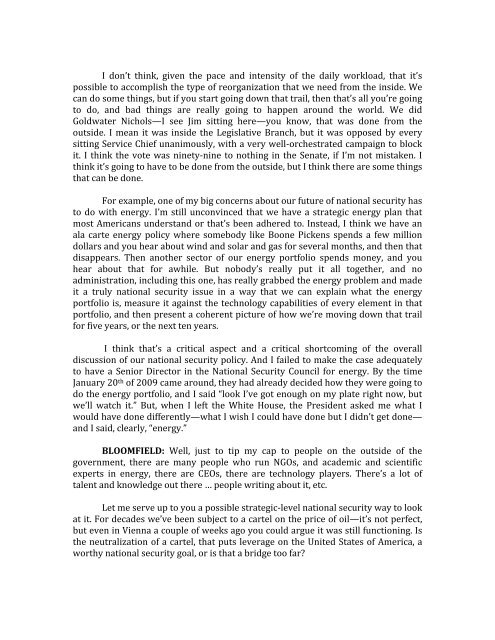Interview of GENERAL JAMES L. JONES, USMC - The Stimson Center
Interview of GENERAL JAMES L. JONES, USMC - The Stimson Center
Interview of GENERAL JAMES L. JONES, USMC - The Stimson Center
You also want an ePaper? Increase the reach of your titles
YUMPU automatically turns print PDFs into web optimized ePapers that Google loves.
I don’t think, given the pace and intensity <strong>of</strong> the daily workload, that it’s<br />
possible to accomplish the type <strong>of</strong> reorganization that we need from the inside. We<br />
can do some things, but if you start going down that trail, then that’s all you’re going<br />
to do, and bad things are really going to happen around the world. We did<br />
Goldwater Nichols—I see Jim sitting here—you know, that was done from the<br />
outside. I mean it was inside the Legislative Branch, but it was opposed by every<br />
sitting Service Chief unanimously, with a very well‐orchestrated campaign to block<br />
it. I think the vote was ninety‐nine to nothing in the Senate, if I’m not mistaken. I<br />
think it’s going to have to be done from the outside, but I think there are some things<br />
that can be done.<br />
For example, one <strong>of</strong> my big concerns about our future <strong>of</strong> national security has<br />
to do with energy. I’m still unconvinced that we have a strategic energy plan that<br />
most Americans understand or that’s been adhered to. Instead, I think we have an<br />
ala carte energy policy where somebody like Boone Pickens spends a few million<br />
dollars and you hear about wind and solar and gas for several months, and then that<br />
disappears. <strong>The</strong>n another sector <strong>of</strong> our energy portfolio spends money, and you<br />
hear about that for awhile. But nobody’s really put it all together, and no<br />
administration, including this one, has really grabbed the energy problem and made<br />
it a truly national security issue in a way that we can explain what the energy<br />
portfolio is, measure it against the technology capabilities <strong>of</strong> every element in that<br />
portfolio, and then present a coherent picture <strong>of</strong> how we’re moving down that trail<br />
for five years, or the next ten years.<br />
I think that’s a critical aspect and a critical shortcoming <strong>of</strong> the overall<br />
discussion <strong>of</strong> our national security policy. And I failed to make the case adequately<br />
to have a Senior Director in the National Security Council for energy. By the time<br />
January 20 th <strong>of</strong> 2009 came around, they had already decided how they were going to<br />
do the energy portfolio, and I said “look I’ve got enough on my plate right now, but<br />
we’ll watch it.” But, when I left the White House, the President asked me what I<br />
would have done differently—what I wish I could have done but I didn’t get done—<br />
and I said, clearly, “energy.”<br />
BLOOMFIELD: Well, just to tip my cap to people on the outside <strong>of</strong> the<br />
government, there are many people who run NGOs, and academic and scientific<br />
experts in energy, there are CEOs, there are technology players. <strong>The</strong>re’s a lot <strong>of</strong><br />
talent and knowledge out there … people writing about it, etc.<br />
Let me serve up to you a possible strategic‐level national security way to look<br />
at it. For decades we’ve been subject to a cartel on the price <strong>of</strong> oil—it’s not perfect,<br />
but even in Vienna a couple <strong>of</strong> weeks ago you could argue it was still functioning. Is<br />
the neutralization <strong>of</strong> a cartel, that puts leverage on the United States <strong>of</strong> America, a<br />
worthy national security goal, or is that a bridge too far?
















